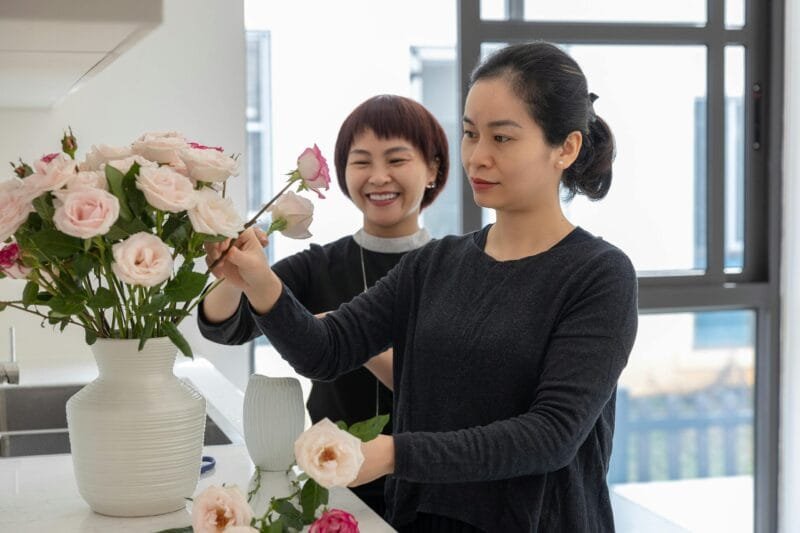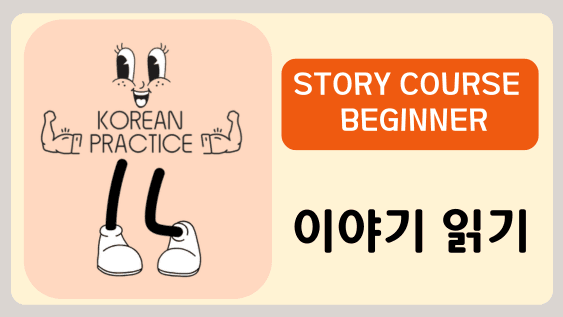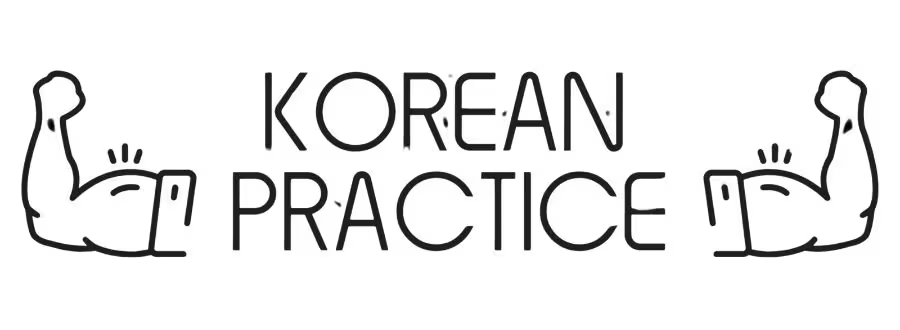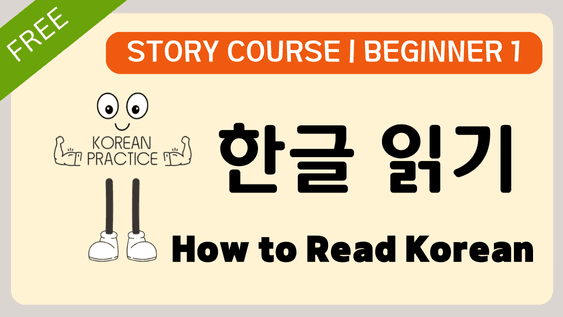“취미 (chwi-mi)” means hobby in Korean.
To talk about your hobbies, you can use expressions like “제 취미는 독서예요” (My hobby is reading) or “운동하는 걸 좋아해요” (I like exercising).
Learning how to talk about hobbies helps you connect naturally with Korean speakers — it’s one of the easiest ways to start real conversations.

Want to sound natural when talking about your hobbies in Korean?
In this guide, you’ll discover:
- Must-know vocabulary and verbs for hobbies 🏀🎨🎵
- How to say “My hobby is ___” and “I like ___”
- Real example sentences you can start using today
Let’s dive in and explore how to talk about hobbies in Korean like a native speaker!
Follow These Steps
Step 1: Listen & Shadow
Follow the audio and speak along with the highlighted text.
Step 2: Check & Learn
Use the breakdowns to understand grammar, vocab, and meaning.
Step 3: Review Visually
Watch the reading practice video to reinforce the story.
Go Deeper
STEP 1 Listen & Shadow
Click play and speak along with the highlighted text below
Table of Contents
STEP 2 Check & Learn
Basic Vocabulary for Talking About Hobbies in Korean
Before we dive into specific hobbies, it’s important to know some basic vocabulary related to hobbies in Korean. Here are some useful words and phrases to get you started:
- 취미 (chwe-mi) – hobby
- 관심사 (gwan-sim-sa) – interest
- 열정 (yeol-jeong) – passion
- 좋아하다 (jo-a-ha-da) – to like
- 즐기다 (jeul-gi-da) – to enjoy
- 하다 (ha-da) – to do
Example Sentence
Original Korean Sentence
A: 취미가 뭐예요? B: 저는 요리를 좋아해요.
Pronunciation Guide
A: 취미가 (chwi-mi-ga) 뭐예요 (mwo-ye-yo)? B: 저는 (jeo-neun) 요리를 (yo-ri-reul) 조아해요 (jo-a-hae-yo).
Meaning and Context
A: 취미 (hobby) 가 (my subject is your hobby) 뭐 (what) 예요 (is; I’m asking you polite and friendly)? B: 저 (I; in a humble way) 는 (I’m going to talk about me) 요리 (cooking) 를 (my object is cooking) 좋아하 (to like) 해요 (I’m telling you polite and friendly).
English Translation
A: What is your hobby? B: I like cooking.
Literal Translation
A: What is (your) hobby? B: I like cooking.
✍️ Related: 대박 Meaning: The Korean Word That Means “Awesome!”
How to Say Different Hobbies in Korean
Now that we have some basic vocabulary under our belts, let’s take a look at how to say different hobbies in Korean. We’ll cover sports, art and music, reading and writing, travel, and other hobbies in South Korea.
Sports
- 축구 (chuk-gu) – soccer
- 야구 (ya-gu) – baseball
- 농구 (nong-gu) – basketball
- 배구 (bae-gu) – volleyball
- 테니스 (te-ni-seu) – tennis
- 골프 (gol-peu) – golf
- 수영 (su-yeong) – swimming
- 승마 (seung-ma) – horseback riding
- 스케이팅 (seu-ke-i-ting) – skating
- 스키 (seu-ki) – skiing
- 스노우보드 (seu-no-u-bo-deu) – snowboarding
Art and Music
- 미술 (mi-sul) – art
- 음악 (eum-ak) – music
- 그림 그리기 (geu-rim geu-ri-gi) – drawing
- 삼중주 (sam-jung-ju) – cello
- 바이올린 (ba-i-o-lin) – violin
- 피아노 (pi-a-no) – piano
- 기타 (gi-ta) – guitar
- 드럼 (deu-reom) – drums
- 댄스 (daen-seu) – dancing
Reading and Writing
- 독서 (dok-seo) – reading
- 쓰기 (sseu-gi) – writing
- 수필 (su-pil) – essay
- 소설 (so-seol) – novel
- 시 (si) – poem
- 웹툰 (weop-tun) – webtoon
Travel
- 여행 (yeo-haeng) – travel
- 국내 여행 (guk-nae yeo-haeng) – domestic travel
- 해외 여행 (hae-oe yeo-haeng) – international travel
- 캠핑 (kaem-ping) – camping
- 등산 (deung-san) – hiking
- 스노쿨링 (seu-no-kul-ling) – snorkeling
- 서핑 (seo-ping) – surfing
Creative Activities
- 노래 부르기 (norae bureugi) – singing
- 연기 (yeongi) – acting
- 피아노 연주 (piano yeonju) – playing piano
- 그림 그리기 (geurim geurigi) – drawing
- 요리 (yori) – cooking
- 글쓰기 (geulssugi) – writing
Games and Entertainment
- 비디오 게임 (bidio geim) – video games
- 보드 게임 (bodeu geim) – board games
- 카드 게임 (kadeu geim) – card games
- 영화 (yeonghwa) – movies
- 음악 듣기 (eumak deutgi) – listening to music
- 만화 (manhwa) – comics
- 애니메이션 (aenimeisyeon) – anime
Fitness and Health
- 요가 (yoga) – yoga
- 필라테스 (pilateseu) – pilates
- 필드하키 (pildeuhaki) – field hockey
- 레슨 받기 (reseun batgi) – taking lessons (e.g. dance, martial arts)
- 승마 (seungma) – horseback riding
- 등산 (deungsan) – mountain climbing
Example Sentence
Original Korean Sentence
요가를 자주 하고 있어요.
Pronunciation Guide
요가를 (yo-ga-reul) 자주 (ja-ju) 하고 (ha-go) 잇써요 (it-sseo-yo).
Meaning and Context
요가 (yo-ga) 를 (my object is yoga) 자주 (frequently) 하 (to do) 고 있 (~ing) 어요 (am; I’m telling you polite and friendly).
English Translation
I practice yoga frequently.
Literal Translation
(I)’m doing yoga frequently.
✍️ Related: Teacher in Korean: The 5 Correct Ways to Address Teachers (Avoid These Common Mistakes!)
Crafts and DIY
- 바느질 (baneujil) – sewing
- 자수 (jasu) – embroidery
- 퀼트 만들기 (kwilteu mandeulgi) – quilt making
- 목공예 (mokgong-ye) – woodworking
- 화원 예술 (hwawon yesul) – flower arrangement
Food and Beverage
- 차 마시기 (cha masigi) – drinking tea
- 주류 탐구 (juryu tamgu) – exploring alcoholic beverages
- 맥주 만들기 (maekju mandeulgi) – beer brewing
- 와인 시음 (wain si-eum) – wine tasting
- 티타임 (titaimeu) – afternoon tea
Technology and Coding
- 코딩 (koding) – coding
- 웹 디자인 (web dijain) – web design
- 앱 개발 (ap gae-bal) – app development
- 사진 촬영 (sajin chwal-yeong) – photography
- 비디오 편집 (bidio pyeonjip) – video editing
Travel and Exploration
- 해외 여행 (haeoe yeohaeng) – overseas travel
- 국내 여행 (guknae yeohaeng) – domestic travel
- 자연 탐험 (jayeon tamheom) – nature exploration
- 유적지 탐방 (yujeokji tambang) – visiting historical sites
- 먹거리 탐방 (meokgeori tambang) – exploring local cuisine
Other Hobbies
- 요리 (yo-ri) – cooking
- 먹기 (meok-gi) – eating
- 컬렉팅 (keol-lek-ting) – collecting
- 자전거 타기 (ja-jeon-geo ta-gi) – cycling
- 애완동물 키우기 (ae-wan-dong-mul ki-u-gi) – raising pets
- 플레이스테이션 게임하기 (peul-le-i-seu-te-i-syeon ge-im-ha-gi) – playing PlayStation games
Example Sentence
Original Korean Sentence
전 일본 요리를 만들어 봤어요.
Pronunciation Guide
전 (jeon) 일본 (il-bon) 요리를 (yo-ri-reul) 만들어 (man-deu-reo) 봤어요 (bwat-sseo-yo).
Meaning and Context
저 (I; in a humble way) ㄴ (my topic is myself) 일본 (Japan) 요리 (cooking) 를 (my object is Japanese food) 만들 (to make) 어 보 (to try) 았 (past tense) 어요 (I’m telling you polite and friendly). * 저 + ㄴ = 전, 보 + 았 = 봤
English Translation
I have tried making Japanese food.
Literal Translation
I tried making Japan cooking.
✍️ Related: Konglish: The Fun Mix of Korean and English
Tips for Learning Korean Vocabulary
Learning a new language can be challenging, but there are some tips and tricks that can help make the process easier. Here are a few tips for learning Korean vocabulary:
- Practice regularly: Consistency is key when it comes to language learning. Try to practice a little bit every day, whether it’s through studying vocabulary or practicing speaking with a language exchange partner.
- Use flashcards: Flashcards can be a great way to memorize vocabulary quickly. Write the Korean word on one side of the card and the English translation on the other side, and quiz yourself regularly.
- Watch Korean media: Watching Korean dramas, movies, or YouTube videos can be a fun way to practice your listening and comprehension skills while also picking up new vocabulary.
- Use language learning apps: There are a variety of language learning apps available that can help you practice vocabulary and grammar. Some popular options include Duolingo, Memrise, and Rosetta Stone.
Step 3: Review Visually
Let’s review everything you learned through a visual story.
Start the Story Course
Looking for super easy way to learn Korean?

Most Korean courses stop at grammar. Mine goes beyond — with stories, Story Style Breakdown™, and real practice to help you speak.
FAQs (What You Might Still Wonder About)
What are the most popular hobbies in Korea today?
Korean people enjoy hobbies like hiking (등산), café hopping (카페 투어), and watching dramas (드라마 보기). If you’re visiting Korea, these are great topics to bring up in conversation.
How do you ask someone about their hobbies in Korean?
The most natural way is “취미가 뭐예요?” (chwi-mi-ga mwo-ye-yo?), meaning “What’s your hobby?” You can also say “요즘 뭐 하는 걸 좋아해요?” (What do you like doing these days?) for a softer tone.
What’s the difference between “취미” and “관심사” in Korean?
Both mean “interest,” but 취미 usually refers to an activity you actually do, while 관심사 is more about what you care about or find interesting.
How do Koreans usually talk about hobbies in daily conversation?
In casual speech, many Koreans drop the subject and just say, for example, “요즘 운동해요.” (I work out these days) or “요리하는 거 좋아해요.” (I like cooking.) Short and natural!
What are some hobbies that sound more “Korean”?
Hobbies like 노래방 가기 (going to karaoke), 카페에서 공부하기 (studying at cafés), and 사진 찍기 (taking photos) are common in Korean life and pop culture.
Can I use hobby expressions to sound more natural when speaking Korean?
Absolutely! Instead of memorizing word lists, use full expressions like “저는 주말에 등산해요.” (I go hiking on weekends) or “시간 있을 때 영화 봐요.” (I watch movies when I have time.) Speaking this way helps you sound fluent faster.
Final words
Learning how to talk about your hobbies in Korean is a useful skill for anyone interested in the language or culture. By using the vocabulary and phrases we’ve covered in this article, you’ll be well on your way to having conversations about your favorite hobbies in Korean. Remember to practice regularly and have fun with it!








